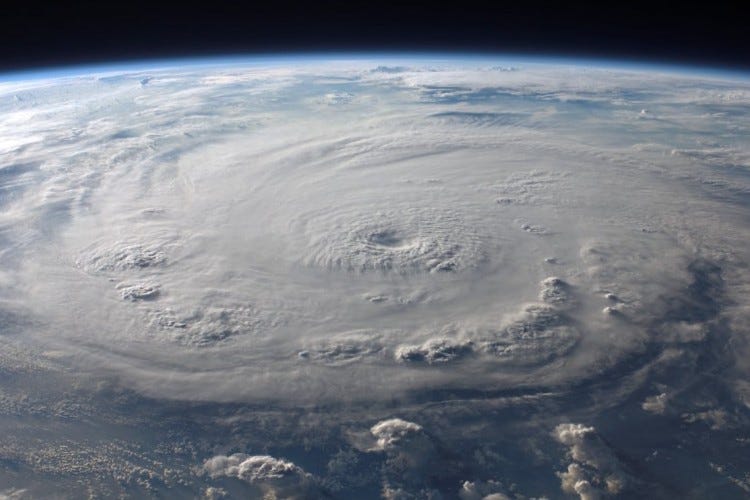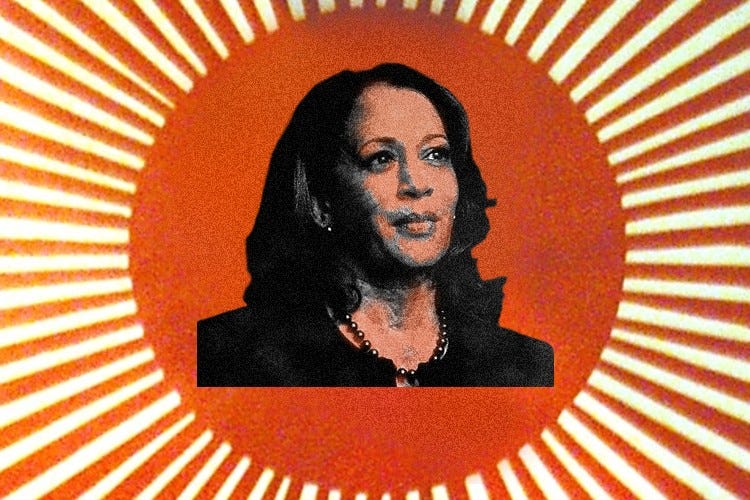
The situation in Florida is not good, to say the least. They’ve been hit by two major hurricanes in two weeks, which is a lot even for a state that has a major university nicknamed “the hurricanes”, which seems like an egregious case of defiantly wagging your privates at God. Our thoughts, prayers, and — most importantly — dollars are with those affected; here’s where you can donate. And, in fact, donating should allow you to skip the “thoughts and prayers” part, which doesn’t do shit anyway.
I typically don’t have much to say about natural disasters, because you can’t control the weather. Or at least I can’t — I’m not Jewish.1 And the relationship between climate change and more frequent and powerful storms has been discussed to death — I don’t think that evacuees sitting in a hotel in Georgia hoping that their house isn’t a pile of kindling want to hear that sermon right now. So, I’ll focus on a narrow-but-relevant point: These storms show why price caps — which are hated by economists but suddenly popular among our presidential candidates — are a bad idea.
I’m from Southeastern Virginia, where there’s a hurricane threat almost every year. Sometimes, I’d learn that a storm was coming because there was suddenly no toilet paper at the grocery store. It’s funny that stocking up on toilet paper is every human’s first instinct when danger approaches; there’s something deep in our lizard brain that screams “PRIORITIZE YOUR ASS!!!” Toilet paper would often sell out before water, canned food, or beer, the last of which every Hampton Roads resident knows is the key ingredient for a kick-ass hurricane party.
Many goods face sudden shortages in a disaster: Water, gasoline, and food are frequently the focus of “price gouging” laws that exist in many states. Those laws cap the price of certain goods during an emergency. And it’s easy to see why people get angry about suddenly high prices during a disaster; personally, I have a visceral reaction to inflated prices at ballgames and movie theatres, so I’d probably burst into flames if someone tried to charge me $20 for a bottle of water during a hurricane. It really seems like price gouging laws make sense. But they create weird incentives that can make things worse at the worst possible time.
Let’s focus on toilet paper. It gets bought up before a hurricane because people know that they might be stuck in their house for a few days, and they don’t want their lesser-worn clothing and fur-covered house pets to be “pressed into service”, so to speak. If toilet paper is sold at the normal price, there’s no reason not to stock up — even if you don’t end up needing any extra paper at all, you bought at the normal price, so no harm done. So, the first person to get to Kroger cleans out the store and rides out the hurricane atop a mountain of two-ply luxury, while everyone else ends up having to throw out their socks and sofa cushions after the storm.
But if toilet paper starts selling for $10 a roll when demand suddenly surges, the first person to get to Kroger will face different math. They’ll ask themselves “How much toilet paper do I actually need?” and then do a quick calculation based on the amount of toilet paper they already have, the number of days they expect to be stuck, and their planned diet over those days. And then they’ll buy only what’s essential. Other people will do the same thing, and folks who don’t really need toilet paper — like bidet owners and divorced women who still have their wedding dresses — will opt out entirely. And that helps prevent shortages.
The other thing that will happen when TP sells for jacked-up prices is that companies will divert supply to where it’s needed. During a hurricane, most of the country is not experiencing an Ass Emergency, so they won’t notice if five percent of shipments get diverted to the disaster zone. But that five percent will mean the world to disaster victims who are facing rectal 9/11. If TP is at $10 a roll, the Charmin Bears — America’s third-richest family — will move mountains to get their product where it will make the most money. And that will prevent shortages and eventually lower prices.
All of this is totally counterintuitive. It really does seem like jacking up prices during a crisis should earn you a Nobel Prize in Assholery and be forbidden. But the market forces I’m describing are real,2 and it does look like Florida’s anti-price gouging law is contributing to shortages. And yet, there’s a bipartisan consensus that the anti-gouging law is good; Ron DeSantis’ government extended the law, and Kamala Harris warned price gougers of “consequences”. Which seems like more evidence that both parties have suddenly decided that even though there are hundreds if not thousands of years of evidence that price caps lead to shortages and hardship, maybe this time they’ll work.
The most mocked price cap proposal of this campaign — including by me — is Harris’ Rapid Response Grocery Price SWAT Team (or whatever she’s calling it). But the most consequential price cap proposal is surely Trump’s plan to cap credit card interest at 10 percent. Economists across the political spectrum hate that idea, because it would deny credit cards to people with low incomes and/or bad credit and raise fees for everyone else. The plan has barely been discussed at all, probably because it’s not in Trump’s joke of a platform, and because Trump says so much strange shit that off-the-wall policy proposals have a real “Duffman says a lot of things” feel to them. But it’s a real proposal that Trump did make, and if he was taken seriously by anyone, then he’d have to explain why he’s proposing a policy that’s like something that AOC and Bernie Sanders once proposed, except dumber.
Supply and demand exist. Always, period, no exceptions,3 even in disasters. When laws prevent prices from rising in response to demand, the result is shortages, chaos, and — in extreme cases — people wiping their asses with cats. It’s likely that right now, price gouging laws in Florida are making a bad situation worse. Maybe Hurricane Milton will accidentally teach our policy makers a lesson that they seem determined not to learn.
If you don’t know that’s a joke, then this probably isn’t the blog for you.
I should add a qualifier: The market forces I described don’t necessarily work as neatly in every single case as they do in the toilet paper example. For example, people are debating whether there should be a law preventing flights out of Florida right now from being sold at several times their normal rate. The argument that things would work differently when it comes to flights is twofold: 1) People don’t really hoard airline tickets, and 2) There might be a runway shortage making it impossible for carriers to add more flights. These are points worth considering, but I think that things would still work more-or-less as they would in a normal case. That’s because it’s true that people don’t buy 50 airline tickets and hoard them in their garage, but a person in a relatively safe area who doesn’t have to evacuate might do so anyway if they can get a $79 super-saver ticket to New York. That person takes a seat away from someone who has to leave. Also, airports in Tampa and St. Pete might be at capacity (though I don’t know that they are), but are Orlando, Gainesville, and Daytona Beach also at capacity? Also, if carriers can charge higher prices, they might cancel a flight to Berlin — a flight that nobody is taking to escape a hurricane — and schedule another flight to Atlanta. Also, American Airlines does seem to have found a way to add capacity.
When I say “no exceptions”, economists are going to yell “Giffen goods!” at me. But those goods do have a demand curve — it’s just unusual.







It’s been a rough few weeks for cats.
Isn’t “I’m not Jewish” the password to gain admittance to the Rothschild Space Laser control room?